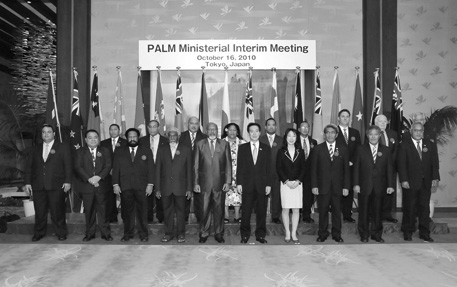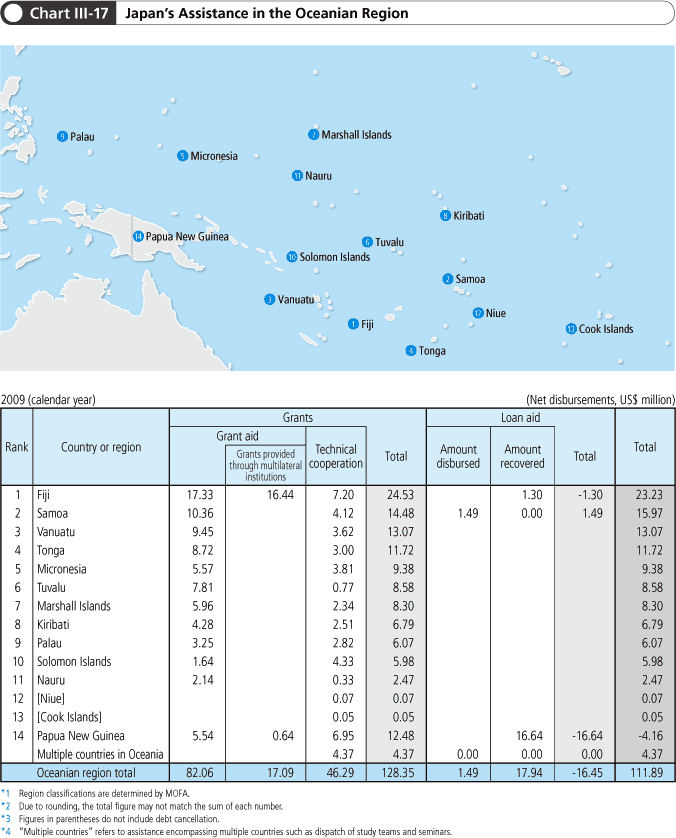Japan's Official Development Assistance White Paper 2010
7. Oceania
Japan and the Pacific island countries and regions are neighbors sharing the Pacific Ocean. They have strong historical ties. Having an immense Exclusive Economic Zone (EEZ), these countries and regions provide strategic sea lanes for maritime transportation and an important ground for Japan’s deep-sea fishery industry. Therefore, sustainable peace and prosperity in this region are extremely important for Japan.
Many Pacific island countries have achieved independence relatively recently. It is crucial for them to become socially and economically self-reliant states. There are a number of difficulties which island countries and regions face in particular, such as small-scale economies, dependence on primary industries, geographic dispersion, lack of easy access to international markets, vulnerability to natural disasters, and the risk of losing land territory. Furthermore, the region faces problems relating to democratization, such as political change in Fiji.
Based on such circumstances, and as a friendly partner of Oceanian countries and regions, Japan provides assistance taking into account the individual situations of each country and region.

Minister for Foreign Affairs Seiji Maehara, Chair of the PALM Ministerial Interim Meeting
<Japan’s Efforts>
To achieve political stability and independent economic development in Oceania, it is essential to overcome social and economic weaknesses and pursue regional cooperation. Japan has promoted cooperation with the Pacific Islands Forum (PIF), a framework for regional cooperation composed of the leaders of the Pacific countries and regions. The Japan-PIF Summit Meeting, a leaders’ meeting of Japan and the PIF countries, has been held once every three years since 1997.
In May 2009, the 5th Japan-PIF Summit Meeting was held in Tomamu, Hokkaido, where Japan pledged assistance totaling approximately ¥50 billion up until the next Summit Meeting scheduled for 2012. In the sectors of environment and climate change, which is one of the three pillars of this assistance, Japan proposed the Pacific Environment Community (PEC), which is a framework where Japan and Pacific island countries work together. Japan also provides assistance to Pacific island countries and regions from the perspective of human security in order to support them in overcoming vulnerabilities. Moreover, in order to enhance human exchanges Japan will implement the Kizuna Plan, which includes youth exchanges between Japan and Pacific island countries and regions of over 1,000 people for the ensuing three years beginning in 2009.
When the 40th PIF General Meeting was held in Cairns, Australia in August 2009, the Cairns Compact was adopted with the goal of promoting aid coordination for the development of the PIF member countries and regions. Japan also contributes to the promotion of aid coordination for the realization of effective and efficient development in the Oceanian region, such as the Cairns Compact.
The island countries and regions of the Pacific face common development problems in the education, environment, and health care sectors. In order to achieve the sustainable development of these countries, Japan provides regional cooperation not only to each individual country, but also to the entire Pacific region, taking into account region-wide benefits. For instance, Japan provides grant aid to help build a center at the University of the South Pacific (USP) in Fiji that carries out research on areas such as information and communications technology, and provides related machinery and equipment for the center. In addition, through assistance for developing distance learning network facilities for USP, Japan provides the people in the Pacific island countries and regions with a wide range of opportunities to receive secondary education. Japan also contributes to resolving the Oceanian region’s environmental problems through dispatching experts to the South Pacific Regional Environmental Programme (SPREP), a regional international agency in Samoa, providing training for waste countermeasures, and assisting in the preparation of a waste countermeasures master plan.
Japan also takes part in various regional undertakings in measures against infectious diseases. For instance, in order to strengthen vaccination projects in the region, Japan has extended cooperation together with the World Health Organization and UNICEF in implementing the Expanded Programme on Immunization (EPI) focused on safe inoculations, including provision of vaccines, maintenance of cold chains, and safe disposal of medical waste. Therein, assistance is provided to improve the rate of immunization against measles and Type-B hepatitis.
Regarding its collaboration with international organizations, under the framework of the Accelerated Co-Financing scheme with ADB (ACFA), Japan provided Samoa with an ODA loan in December 2007. This loan encompassed the building and repairing of efficient power plants, disaster countermeasures by laying power lines underground, and upgrading to high-efficiency power lines.

●Palau: Project for Introduction of Clean Energy by Solar Electricity Generation System
Palau is dependent on diesel power generation for the majority of its major sources of power. Since the country covers all of the fuel (crude oil) supplies through imports, it is greatly affected by fluctuations in the international price of crude oil. Moreover, the rise in the amount of crude oil consumed in recent years has brought about a rise in emissions of carbon dioxide. For this reason, lessening the dependence on diesel power generation represents a pressing issue.
Through a grant aid of about ¥480 million, Japan has provided equipment and machinery related to solar power generation and made efforts to replace some of the diesel power generation with renewable energies. Doing so will reduce the amount of fuel for diesel power generation that is consumed, while also cutting back on emissions of carbon dioxide. The project is also expected to mitigate the degree of dependence on imported fuels and increase the independence of the state.
